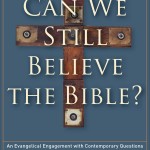
Each week during the #LentChallenge we’ve been asking Dr. Craig Blomberg, New Testament scholar and author, YOUR questions.
While reading the epistles we came across what may be one of the most divisive passages of our time which led several of you to ask this hot button question:
The ban on women speaking just seems so out of place in 1 Corinthians 14:34-35, like it was inserted later. It just doesn’t seem to go with the rest of the book. Did Paul really tell women to keep quiet in churches? How do you interpret 1 Corinthians 14:34-35?
The very fact that verses 34-35 seem to interrupt Paul’s flow of thought is probably a key to their interpretation.
Paul has been speaking about spiritual gifts, beginning in 1 Corinthians 12. In chapter 14, he narrows the topic to the two gifts of prophecy and speaking in tongues. The Greek verb for “speak” occurs 22 other times in this chapter alone outside of these two verses, and in all but one instance it appears in the context of very special forms of speech—prophecy, evaluating prophecy, speaking in tongues or interpreting tongues. Three of these four activities reflect spiritual gifts that God gives to people as He determines (12:11), irrespective of gender (Acts 2:17-18). Everyone who hears an alleged prophecy, however, is to evaluate it (1 Cor. 14:29).
But who would determine the authoritative evaluation of whether the prophecy was legitimate or not?
The church’s elders or overseers are the group who elsewhere have responsibility for the church’s authoritative teaching (see esp. 1 Tim. 5:17). So it is very possible that Paul is assuming that only men will form the church’s eldership. It is also noteworthy that he assumes women can ask questions of their “men” (fathers or husbands) at home, in a culture in which women did their best to come or remain under the protection of men in a very patriarchal and hierarchical culture). With noticeably less access to education they may well have often had very basic questions about the Christian faith that would have interrupted proceedings too much to answer on the spot.
The most controversial question is whether Paul’s restrictions still apply in cultures where women attain a considerable measure of equal opportunity for training.
But you didn’t ask that question and what you asked is complicated enough! So, yes, Paul did ask women to keep quiet, but only in this one very specific context of pronouncing a verdict on apparent Christian prophecy and possibly only because they were ill-equipped at the time for the task.
***
 To read more of Dr. Blomberg’s insights, pick up a copy of his latest book, Can We Still Believe the Bible? An Evangelical Engagement with Contemporary Questions, here.
To read more of Dr. Blomberg’s insights, pick up a copy of his latest book, Can We Still Believe the Bible? An Evangelical Engagement with Contemporary Questions, here.







